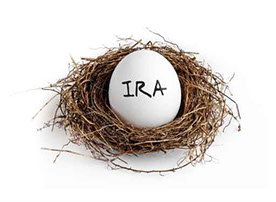Home - Tom's Blog - Contact Us


New IRA Tax Laws- Tom Gucciardi
Important law changes to anyone leaving Qualified funds (IRA, etc.) to any beneficiary
The major changes of the SECURE Act Passed in Dec, 2020 are:
1. All funds in a qualified plan (IRA) may be left to the beneficiary, but it must be withdrawn over a ten year period in their lifetime. Stretch IRA's , a common term that was used so your beneficiary may pay the tax over their lifetime is over. Please Call Tom Gucciardi: 954-804-4381 to discuss options to leave your IRA Tax Free to your beneficiaries.
2. The current owner of an IRA may wait until the age of 72 to start taking RMD's. (Required Minimal Distribution) The problem with this tactic is it creates more taxes for your beneficiaries.
The answer is to call Tom Gucciardi : 954-804-4381 and learn how to convert your IRA into a tax free single premium life contract.

The first important new law impacting retirement distributions in over a decade was enacted on December 20, 2019 as the SECURE Act (“Setting Every Community Up for Retirement Enhancement Act of 2019”). The Act provides certain beneficial income tax changes for individuals who turn 70½ in 2020 and beyond, but it also imposes harsher tax consequences on non-spouse beneficiaries (such as children and grandchildren) who inherit a retirement account from someone who dies after January 1, 2020.
Call Tom Gucciardi -954-804-4381
On the positive side, the Act increases the age when an individual must begin to take required minimum distributions (RMDs) to age 72 (from age 70 ½). This change is effective for any IRA owner who turns 70½ in or after 2020. This will enable individuals to defer distributions (and the taxes due) until age 72.
If an individual turned 70½ in 2019, he or she must take the RMD for 2020 and following years (unless there is further IRS guidance on this in 2020).
The Act also eliminates the maximum age limit for contributions to a traditional IRA if the individual is still working and has earned employment income. Previously, no contribution could be made to an IRA after age 70½.
The foregoing positive changes for taxpayers under the Act are offset by a significant adverse income tax consequence to a beneficiary who inherits an IRA after January 1, 2020 — if that beneficiary is not the surviving spouse (e.g. a child or grandchild). For these so-called inherited IRAs, the maximum time frame for withdrawing distributions is 10 years after the IRA owner dies. Under prior law, the RMDs could be “stretched“ over the life expectancy of the beneficiary. This change means that income taxes paid on those RMDs by the beneficiary will be accelerated during that 10-year period (and the IRS will collect tax revenue a lot sooner) and the tax-free growth of the inherited IRA will last only a maximum of 10 years, instead of the beneficiary’s lifetime.
Thomas Gucciardi 954-804-4381 Global Financial Group